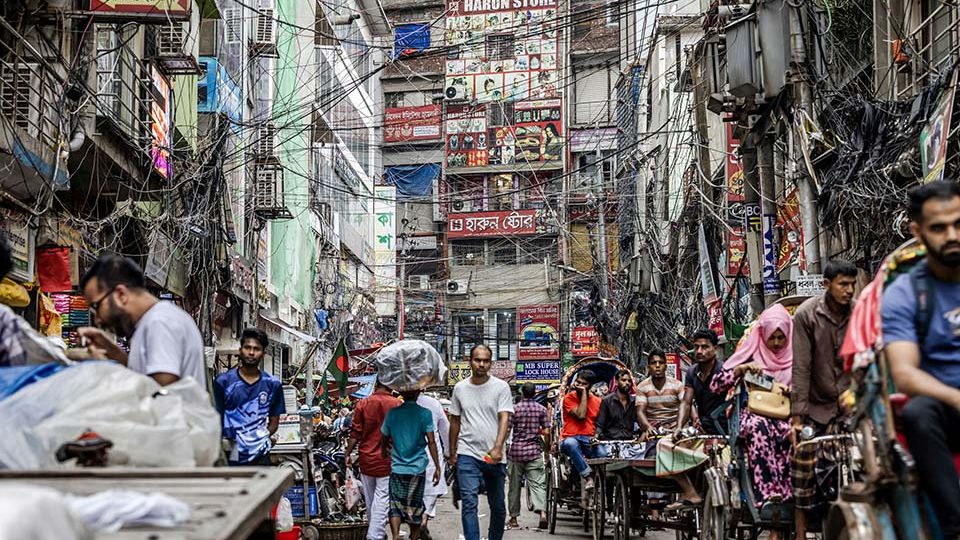June 2, 2025
DHAKA – Bangladesh’s public spending as a share of gross domestic product (GDP) is the lowest among nations on course to graduate from the least developed country (LDC) club.
Economists say that this low level of expenditure, both operational costs and development outlays, could weaken the foundations of the country’s transition and leave the economy vulnerable on several fronts once it loses LDC status.
Following graduation, Bangladesh will no longer enjoy preferential trade access in many global markets and will face tighter terms when seeking foreign loans.
To minimise these shocks, analysts say the government must strengthen the economy through higher investment in key sectors.
They say Bangladesh must ramp up spending on education, healthcare, infrastructure, and social protection to create the conditions typical of a developing economy.
In 2025, the country’s public expenditure stood at just 13 percent of GDP, below the 23.4 percent in Nepal, 18.4 percent in Laos, and 17.9 percent in Cambodia.
The International Monetary Fund (IMF) projects that Bangladesh will raise this figure only marginally to 14 percent in 2026.
Economist Mustafizur Rahman said low revenue collection has forced the government to curtail both its operating and development budgets.
“In developed countries, public spending usually accounts for 35 percent to 40 percent of GDP. In other South Asian nations, it is around 20 percent. But in Bangladesh, it has hovered around 12 percent historically,” Rahman said, citing IMF data.
“If the government intends to spend more, it must either tolerate a higher budget deficit or increase revenue collection,” added Rahman, a distinguished fellow at the local thin tank Centre for Policy Dialogue (CPD).
At present, revenue-to-GDP ratio of Bangladesh stands at just 7.3 percent — lower than that of Nepal, Bhutan, and several other regional peers.
“So, the original sin is the low tax collection,” Rahman said. “On top of that, not all revenue reaches the public coffers due to systemic leakages.”
He mentioned that the government is reluctant to raise the budget deficit as it would increase the debt servicing burden. “Already, interest payments have overtaken education as the largest expenditure item in the national budget.”
The United Nations General Assembly endorsed the graduation of several LDCs.
Bangladesh, Laos, and Nepal are scheduled to graduate in 2026. The Solomon Islands will follow in 2027, with Cambodia and Senegal set to graduate in 2029.
After the graduation, Bangladesh will need to become more competitive and productive to survive in a less preferential global environment, said Prof Mohammad Lutfor Rahman, an economics teacher at Jahangirnagar University.
“This calls for strong and large government investments,” Rahman said.
According to him, if the government fails to invest adequately in health, education and infrastructure, the country’s development may falter.
A CPD report shows that health allocations have remained below 1 percent of GDP for two decades, while education spending was slightly higher to 1.69 percent of GDP in fiscal year 2025.
“To improve outcomes in health and education, a country needs to spend at least 5 percent of GDP in each area. Bangladesh still falls far short of that benchmark,” said the economics professor.
He also pointed out that budget implementation remains a persistent problem. “Even when allocations rise, actual spending falls short. Implementation efficiency is falling and leakages are worsening.”
According to Ministry of Finance, the budget implementation rate dropped to 84 percent in fiscal year 2022–23, down from 91 percent a decade ago.
CPD Distinguished Fellow Rahman recommended increasing tax collection, plugging leakages, improving tax administration and accelerating digital reforms.
With stronger revenue streams, he said, the government could boost investment in human capital and infrastructure — sectors that are critical for helping local businesses compete internationally.
Similarly, Prof Rahman advocated for greater spending in education, health and infrastructure, alongside better implementation and tighter control over financial leakages.


